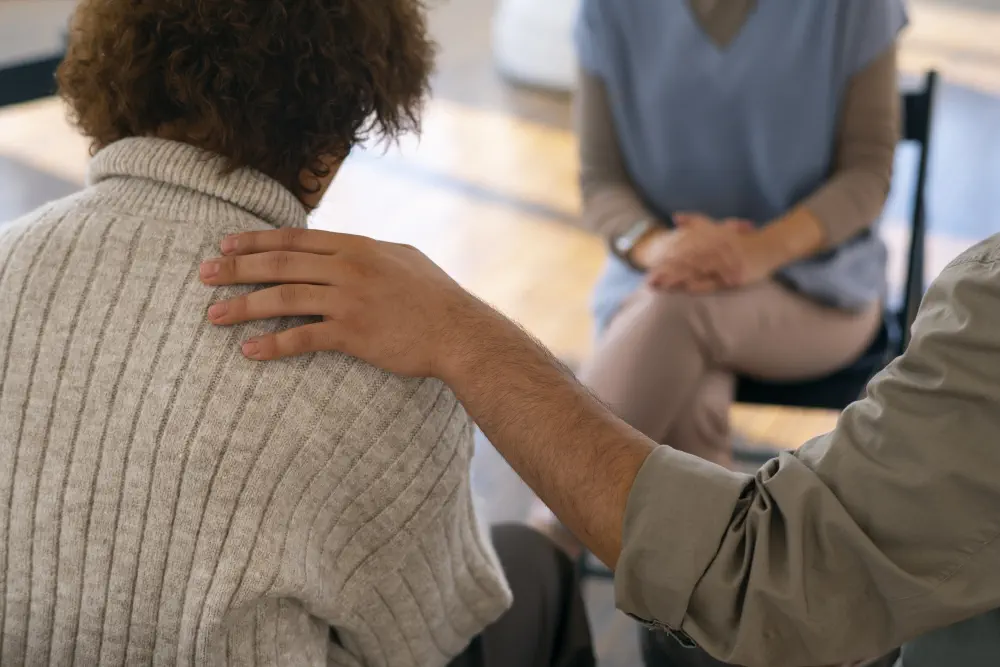We offer medical detox and multiple addiction treatment options in our
luxury treatment centres in Port Hope, Cobourg, and Ottawa.
Understanding Cyclobenzaprine Side Effects
Cyclobenzaprine is a commonly prescribed medication for muscle spasms and pain relief. However, as with any medication, understanding its side effects and how to manage them is crucial to staying safe and healthy. In this article, we'll explore everything you need to know about cyclobenzaprine side effects: what they are, how to minimize them, and what to do if you experience issues. Let’s dive in.
Key Takeaways
- What Cyclobenzaprine Does: A muscle relaxant for short-term use, it eases spasms by reducing nerve signals to the brain.
- Common Side Effects: Drowsiness, dizziness, dry mouth, and constipation are frequent but manageable with hydration, diet, and rest.
- Minimizing Risks: Follow prescribed doses, avoid alcohol, and consult your doctor for adjustments if needed.
- Addiction Risks: Misuse can lead to dependency, with symptoms like withdrawal and increased cravings.
- Safe Use: Use cyclobenzaprine responsibly and seek help if side effects or dependency issues arise.
What Is Cyclobenzaprine?
Primarily used to ease pain and discomfort caused by muscle spasms, cyclobenzaprine is a muscle relaxant. Often administered alongside physical therapy, rest, and other treatments to aid in recovery from acute musculoskeletal disorders such as back pain or neck strain is this medication. Acting on the central nervous system, cyclobenzaprine relaxes muscles, thereby reducing tension and improving mobility.
This drug works by reducing nerve impulses, preventing the pain signals the brain picks up. Although it provides temporary relief, it is not intended for long-term use. Typically prescribed for two to three weeks, extended use increases the risk of adverse cyclobenzaprine side effects. The intention is to offer temporary relief while other treatments deal with the underlying source of the muscular problem.

Cyclobenzaprine is available in the form of tablets and extended-release capsules. The extended-release form is typically taken once a day, while the immediate-release version may be taken multiple times per day, depending on the doctor's instructions. To lower the chance of adverse effects, be sure you closely follow the dosage recommendations of your healthcare practitioner.
Common Cyclobenzaprine Side Effects
Like most medications, cyclobenzaprine may cause side effects. While many individuals find it tolerable, some may have uncomfortable reactions. Here are some of the most common cyclobenzaprine side effects, along with tips for managing them:
1. Drowsiness
Drowsiness is one of the most often occurring cyclobenzaprine side effects. This is due to its effects on the central nervous system, which can make users feel lethargic or fatigued. Taking the prescription in the evening is advisable for managing this, particularly if you have to remain vigilant during the day. After using cyclobenzaprine, avoid driving or running heavy machinery.
2. Dizziness
Dizziness is another often-occurring adverse effect. It could happen from standing up too rapidly or from unexpected movement. Rising gently from a sitting or lying posture will help reduce this danger; try to avoid quick motions. Maintaining hydration also aids in lessening vertigo.
3. Dry Mouth
One quite common side effect of cyclobenzaprine is dry mouth. This discomfort can be relieved by drinking plenty of water and chewing sugar-free gum. You might also think about eliminating caffeine or using mouth moisteners to help with dry mouth.

4. Constipation
Cyclobenzaprine might induce constipation in certain people. To combat this, make sure your diet is high in fibre, and you drink enough water throughout the day. Frequent physical exercise can also help things stay flowing. Sometimes, your doctor may advise over-the-counter laxatives.
5. Blurred Vision
Some users report blurred vision. If this develops, steer clear of activities requiring clear vision until you feel better. If it continues, see your doctor. Headaches could also accompany blurred vision, so it's crucial to avoid eye strain via regular pauses.
6. Fatigue and Weakness
Certain people utilizing cyclobenzaprine also suffer from general muscular weakness and tiredness. This might especially be difficult if you are attempting to keep up with daily tasks. Get adequate sleep to control tiredness; steer clear of too much effort. Short midday naps could help raise energy levels.
7. Nausea
Another possible side effect is nausea, especially in cases of empty stomach drug use. Take cyclobenzaprine with meals or a light snack to help relieve nausea. If nausea continues, discuss with your doctor suitable substitutes or extra drugs to help with this issue.
How to Minimize Side Effects?
Controlling cyclobenzaprine side effects can increase your comfort level while on the medicine. The following hints help to minimize adverse effects:
1. Adjusting Dosage and Timing
See your doctor to have the dosage changed. Sometimes, a lesser dosage is enough to reduce side effects and ease symptoms. Taking cyclobenzaprine at night can also help control daytime drowsiness. Never vary your dosage without consulting your doctor; doing so may have adverse effects or reduced efficacy.
2. Stay Hydrated
Staying hydrated is essential for managing side effects such as dry mouth and constipation. Drink plenty of water throughout the day, and avoid dehydrating substances like caffeine and alcohol. Herbal teas and electrolyte drinks can also help keep you well-hydrated and alleviate some symptoms related to dehydration.

3. Avoid Alcohol
Combining cyclobenzaprine and alcohol can intensify drowsiness and dizziness, increasing the risk of accidents and severe health complications. It’s essential to avoid alcohol entirely while taking cyclobenzaprine. Alcohol can also increase the risk of cyclobenzaprine overdose, which can be life-threatening.
4. Eat a Balanced Diet
A balanced diet can help reduce some gastrointestinal side effects, such as constipation and nausea. Include plenty of fresh fruits, vegetables, and whole grains to promote digestive health. Foods rich in fibre, such as oats, beans, and leafy greens, can help keep constipation at bay.
5. Consult Your Doctor
Always see your doctor if the side effects become severe or disruptive. They may advise you on other treatments or changes in your dosage. Never stop abruptly taking cyclobenzaprine without medical advice, as this will provoke cyclobenzaprine withdrawal. Sometimes, your doctor may want you to go off the medicine gradually to avoid withdrawal.

Cyclobenzaprine Addiction Treatment
While cyclobenzaprine is not regarded as particularly addictive, extended use or abuse might cause dependency. Sometimes, individuals misuse cyclobenzaprine seeking its relaxing properties, which can lead to dependency over time.
Signs of Cyclobenzaprine Addiction
Cyclobenzaprine addiction symptoms could include using the drug longer than advised, increasing dosages, or not being able to stop even if the medicine affects everyday life or health negatively. When trying to quit, those who are suffering could have cyclobenzaprine withdrawal symptoms, including headaches, irritability, or muscle soreness. Other indicators can be changes in behaviour, neglect of obligations, and drug cravings.
Treatment Options
Treating cyclobenzaprine addiction usually calls for an all-encompassing strategy combining support groups, psychotherapy, and medical detox. Medical experts can help lower the risk of consequences and safely help control cyclobenzaprine withdrawal symptoms. Many often utilized to assist individuals in seeing their behaviour patterns and create better-coping mechanisms is cognitive-behavioural therapy (CBT).Apart from CBT, group therapy can offer a supportive community where people exchange experiences and recovery techniques. This helps create responsibility and lessens the loneliness sometimes associated with addiction. Family therapy could also be helpful since it clarifies the addiction process for loved ones and teaches how to assist in recovery attempts.

Seeking expert help is imperative whether you or a loved one is experiencing cyclobenzaprine abuse. Specialized rehabilitation institutions offer a supportive setting where people may heal under medical direction. Changes in lifestyle could also be part of treatment; frequent physical exercise helps lower withdrawal symptoms and enhances mood.
Cyclobenzaprine is an efficient muscle relaxant for temporary use to reduce pain and muscular spasms. Still, managing cyclobenzaprine side effects safely depends on an awareness of them. Following medical advice, keeping informed about possible risks, and seeking help if necessary will help you properly control side effects and prevent consequences, including cyclobenzaprine addiction or cyclobenzaprine overdose. If you have any questions, always speak with your therapist; never hesitate to seek professional help should you suspect use or dependency.
FAQ
Can Cyclobenzaprine Be Taken Long-Term?
No, cyclobenzaprine is typically prescribed for short-term use only, usually for two to three weeks. Long-term use increases the risk of dependency and adverse side effects. If you have chronic muscle pain, discuss alternative treatment options with your doctor.
What Should I Do If I Miss a Dose?
If you miss a dose of cyclobenzaprine, take it as soon as you remember. If it is almost time for your next dose, skip the missed one. Never double the dose to make up for a missed one. Consistency is important, so set reminders to help you stay on track with your medication schedule.
Can I Drink Alcohol While Taking Cyclobenzaprine?
No, cyclobenzaprine and alcohol should not be mixed. Alcohol can intensify the side effects of cyclobenzaprine, such as drowsiness and dizziness, and increase the risk of dangerous complications. The combination can also impair your ability to make sound decisions, increasing the likelihood of accidents.
What Are the Symptoms of Cyclobenzaprine Overdose?
Cyclobenzaprine overdose symptoms may include extreme drowsiness, rapid heartbeat, tremors, or confusion. In severe cases, it can lead to seizures or unconsciousness. Seek emergency medical attention if you suspect an overdose. Overdoses can be life-threatening, so keep cyclobenzaprine out of reach of children and never share your medication.
Is Cyclobenzaprine Addictive?
While cyclobenzaprine is not considered highly addictive, there is potential for misuse, particularly if taken in higher doses or for longer than prescribed. Always follow your doctor’s instructions carefully. If you feel you are developing a dependency, consult your healthcare provider immediately for guidance.






